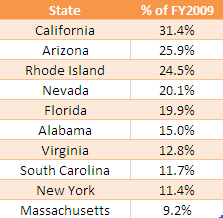Technocrats love to pick winners. Leftish technocrats, in particular, love to believe that the complex operations of the entire economy choose technologies that are inferior to those the technocrat would have imposed on the economy had she been in charge. But here is what happens when they try, in a cautionary tail that is particularly relevant given the number of specific technologies Barack Obama has said he would promote (e.g. a million plug-in hybrids by 2015) (via Tom Nelson)
The federal government has invested billions of dollars over the past 16 years, building a fleet of 112,000 alternative-fuel vehicles to serve as a model for a national movement away from fossil fuels.
But the costly effort to put more workers into vehicles powered by ethanol and other fuel alternatives has been fraught with problems, many of them caused by buying vehicles before fuel stations were in
place to support them, a Washington Post analysis of federal records shows.
"I call it the 'Field of Dreams' plan. If you buy them, they will come," said Wayne Corey, vehicle operations manager with the U.S. Postal Service. "It hasn't happened."
Under a mandate from Congress, federal agencies have gradually increased their fleets of alternative-fuel vehicles, a majority of them "flex-fuel," capable of running on either gasoline or ethanol-based E85 fuel. But many of the vehicles were sent to locations hundreds of miles from any alternative fueling sites, the analysis shows.
As a result, more than 92 percent of the fuel used in the government's alternative-fuel fleet continues to be standard gasoline. A 2005 law -- meant to align the vehicles with alternative-fuel stations -- now requires agencies to seek waivers when a vehicle is more than five miles or 15 minutes from an ethanol pump.
The latest generations of alternative vehicles have compounded the problem. Often, the vehicles come only with larger engines than the ones they replaced in the fleet. Consequently, the federal program --
known as EPAct -- has sometimes increased gasoline consumption and emission rates, the opposite of what was intended....
The Postal Service illustrates the problem. It estimates that its 37,000 newer alternative-fuel delivery vans, which can run on high-grade ethanol, consumed 1.5 million additional gallons of gasoline last fiscal year because of the larger engines.
The article does not even mention that E85 ethanol made mostly from corn does absolutely nothing to reduce total CO2 production (it just shifts it around, due to the amount of energy required to grow corn and convert it to ethanol) while raising food prices.
California did something like this years ago, putting the force of subsidies and state law behind zero-emission vehicles. This wasted a lot of money on electric and hydrogen vehicles that were not yet technologically mature enough to prosper, while missing out on low (but now zero) emissions approaches that could have had much more impact because they were technologically ready (e.g. CNG for fleet vehicles).
Y'all know where I stand on the dangers of CO2. But if we really have to do "something", then the only efficient way to do it is with a carbon tax. But politicians hate this idea, because they don't want to be associated with a tax. But the fact is, that every other action they are proposing is a tax of some sort too, but just hidden and likely less efficient. There is no magic free lunch that Barack Obama and his folks can think of and impose, no matter how smart they are. In fact, to some extent, smarts are a hindrance, because it tempts people into the hubris of thinking that they are smart enough to pick winners.
Postscript: If you are reading this and thinking "well, if I were in charge, I would not be that stupid and I could make it work" then you don't get it. 1) No one can make it work, for the same reasons the Soviets could not plan their economy from the top -- its just too complex. At best, policy-makers are choosing between a handful of alternatives to back. In contrast, every individual has a slate of opportunities to reduce his/her CO2 production at the least cost, and when you add up all these individual portfolios, that means there are hundreds of millions of individual opportunities that must get prioritized. That is what pricing signals do, but government bureaucrats cannot. 2) The morons and knaves ALWAYS take over. Even if you are brilliant and well-motivated, your successor likely will not be. For years, folks have generally been comfortable with the outsized role of the Federal Reserve because they thought Greenspan (and Volker before him) ran it brilliantly. Well, there are arguments to be made about this, but even if we accept this judgment, what happens when the next guy is in charge and is not brilliant?
Postscript #2: If you want a specific example, let's take plug-in hybrids. How can anyone be against these? I personally like the concept of cars being driven by electric traction motors (I like the performance profile of them) and would love a good plug-in hybrid. But what happens when we find out that many of these cars were bought in coal-burning areas where electricity is particularly cheap, and discover coal-fired electricity pollutes more than an internal combustion engine? Or when we use a cap and trade system to cut back on coal fired plants, and find that the huge number of plug-in hybrids are exacerbating brown-outs and electricity shortages? Or we find that the billions of dollars of capital diverted by the government to expanding plug-in hybrids could have easily yielded far more CO2 reduciton had it been applied in another area? That is why a carbon tax is the only way to go (if we are going to do anything) because it allows individuals to make capital expenditure decisions to reduce CO2 based on their vastly higher knowlege of the opportunities and the pricing signal of the tax.





